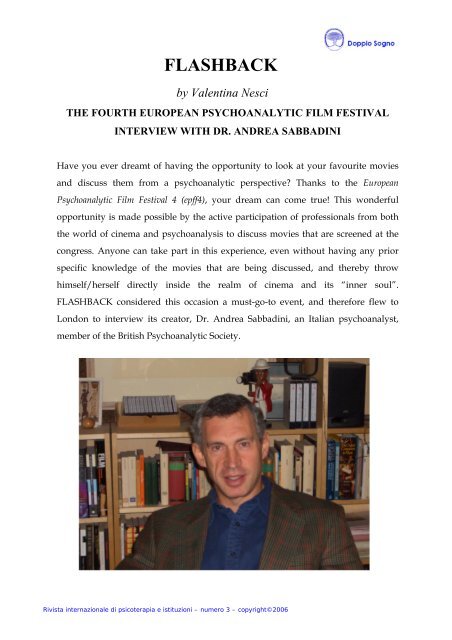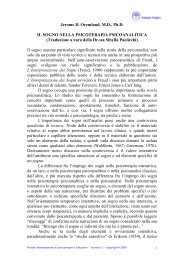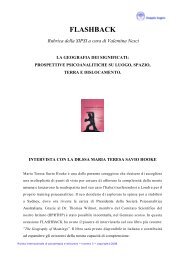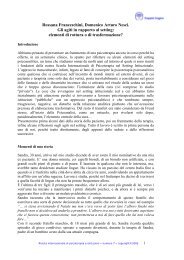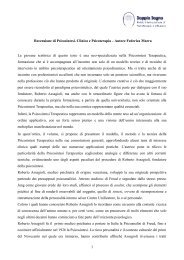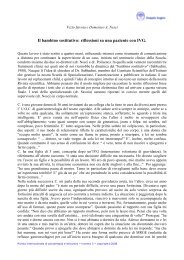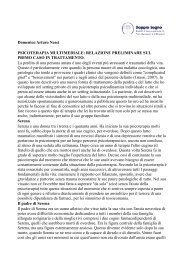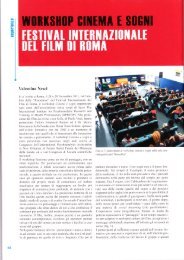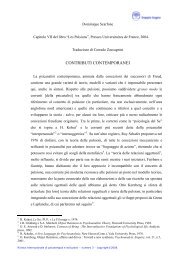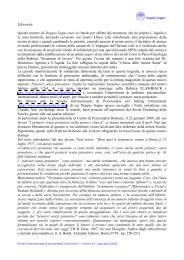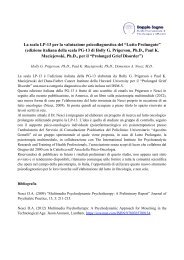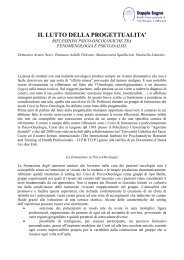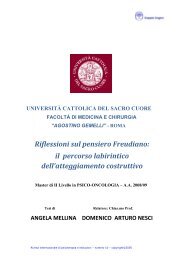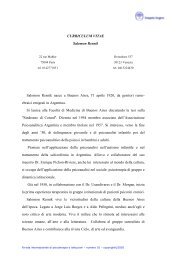Interview with Andrea Sabbadini - Doppio Sogno
Interview with Andrea Sabbadini - Doppio Sogno
Interview with Andrea Sabbadini - Doppio Sogno
You also want an ePaper? Increase the reach of your titles
YUMPU automatically turns print PDFs into web optimized ePapers that Google loves.
FLASHBACKby Valentina NesciTHE FOURTH EUROPEAN PSYCHOANALYTIC FILM FESTIVALINTERVIEW WITH DR. ANDREA SABBADINIHave you ever dreamt of having the opportunity to look at your favourite moviesand discuss them from a psychoanalytic perspective? Thanks to the EuropeanPsychoanalytic Film Festival 4 (epff4), your dream can come true! This wonderfulopportunity is made possible by the active participation of professionals from boththe world of cinema and psychoanalysis to discuss movies that are screened at thecongress. Anyone can take part in this experience, even <strong>with</strong>out having any priorspecific knowledge of the movies that are being discussed, and thereby throwhimself/herself directly inside the realm of cinema and its “inner soul”.FLASHBACK considered this occasion a must-go-to event, and therefore flew toLondon to interview its creator, Dr. <strong>Andrea</strong> <strong>Sabbadini</strong>, an Italian psychoanalyst,member of the British Psychoanalytic Society.Rivista internazionale di psicoterapia e istituzioni – numero 3 – copyright©2006
<strong>Interview</strong> <strong>with</strong> Dr. <strong>Andrea</strong> <strong>Sabbadini</strong>The European Psychoanalytic Film Festival has become a scientific and cultural eventthat cannot be missed by people who are interested in both Psychoanalysis and Cinema.Could you give us some insights as to why and how this fascinating event came to life?In the 1990s I was offered the opportunity to run on behalf of the British PsychoanalyticSociety a programme of events <strong>with</strong> film historian Peter Evans. This involved screenings ofpsychoanalytically interesting works on various themes (i.e. voyeurism; childhood; psychoticbreakdown; brothers and sisters; eating disorders, etc) , followed by discussions betweenpsychoanalysts and film-makers or cinema scholars. This programme is still continuing to dateon a regular basis, on Sunday mornings at the Institue of Contemporay Arts (ICA) in London.On the back of the success of those events, the then President of our Society, Don Campbell,invited me to organize and chair a biennial film festival, where some of our work on thefascinatingly complex relationship between cinema and psychoanalysis could be concentratedin a few intensive days of screenings, panels, workshops and lectures. I set up an organizingcommittee in London and invited colleagues from various European countries to select andrecommend important film from their regions to be shown at the festival. The first edition ofepff took place in the prestigious rooms of BAFTA in London, in November 2001, <strong>with</strong> over300 analysts, critics and film lovers attending from all over the world. Nanni Moretti was thefirst Italian director to come and discuss <strong>with</strong> us his then new The Son’s Room, where ofcourse he plays the part of… a psychoanalyst!In November 2007, the Fourth European Psychoanalytic Film Festival will take place inits usual location. Do you think there is an evolutionary pattern in the structure of eachnew edition of the event?More than an evolutionary pattern, I would say that we have learned from our early mistakesand are constantly improving various aspects of our programme. For instance, we now leavemore time for discussion from the floor, we can afford to be more selective of the films weshow, we have included some animation works and we invite films also from other Europeancountries not represented before at epff. For instance, at epff4 this November 2007 we areplanning to show and discuss also movies from Belgium, Switzerland, Austria and Greece,while in the past most films were from the main film-producing countries, such as Italy, Franceand Germany.Rivista internazionale di psicoterapia e istituzioni – numero 3 – copyright©2006
The past programs of the EPFF had focused on different themes, such as “The inner andouter worlds of the filmmakers temporary social structure” (B. Bertolucci, F. Shaw, C.Mawson, 2001), “The uneasy identity in two generations of Italian film directors” (S.Bolognini, A. Battistini, 2003), and the psychological conflict of a man involved in a hitand-runcar accident (in the movie “Wolfsburg” by C. Petzold, 2005). On which themeswill the 2007 EPFF revolve on?Like in past editions, we do not have a clear-cut programmatic theme for the whole festival,but we allow, or indeed encourage, certain subjects to emerge in the course of the proceedings,around which several presentations then crystallize. This happened, for instance, in 2005 at ourlast epff3, when the theme of ‘loss’ could be identified in several films, panel discussions andlectures. These presentation, by the way, are now collected in Projected Shadows.Psychoanalytic reflections on the representation of loss in European cinema, a volume I haverecently edited for Routledge.As you know Borla just published the Italian version of your book “The Couch and theSilver Screen”. Do you think this will promote creative interactions between film makers,psychoanalysts, and cinema lovers in Italy?I hope so! I must say, though, that several initiatives, some of them modelled on our ownevents in the UK, already exist in other parts of the world, including Italy. As well asscreenings and psychoanalytic discussions of films in Padua, Rome, Naples and other cities,there are already several important publications (such as La mente altrove. Cinema e sofferenzamentale, edited by De Mari, Marchiori and Pavan; or the glossy film magazine Eidos) that arekeeping the interest in this subject alive in our country. Last but not least, let me remind theworkshop “Cinema e Sogni” and the television series “<strong>Doppio</strong> <strong>Sogno</strong>” (created in Rome byThe International Institute for Psychoanalytic Research and Training of Health Professionalsand RAISAT) as two interesting experiences that are very well known to the readers of yourJournal. Of course, I am delighted about such developments as this field, I believe, can be asource of interdisciplinary cultural enrichment for professionals engaged in eitherpsychoanalytic or cinema work, as well as of personal enjoyment for the general public.Rivista internazionale di psicoterapia e istituzioni – numero 3 – copyright©2006
Bernardo Bertolucci is the Honorary President of the EPFF from its very beginning. Howdid your friendship <strong>with</strong> him begin and how did it develop through the years?Back in 1994 I wanted to screen a preview of Little Buddha for my psychoanalytic colleagues,and I dared inviting its director to discuss it <strong>with</strong> us. To my surprise, Bertolucci accepted and,having had several years before an unpleasant experience <strong>with</strong> psychoanalysts in Venice whohad attacked his Novecento, he was pleased that in London we had welcomed him and his filmmuch more warmly. We liked each other and have remained in regular friendly contact eversince. A few years later, he asked me to engage <strong>with</strong> him in a ‘conversation’ on psychoanalysisand cinema in front of a large audience in the aula magna of Vienna University, as part of thecelebrations of Freud’s birthday, and we both particularly enjoyed that occasion. Mycolleagues and I were delighted when, in 2001, Bertolucci agreed to become the HonoraryPresident of our first epff; he has remained in that position ever since, always attending andtaking an active part in our Festivals. More recently, in 2005, we offered him the HonoraryFellowship of the British Psychoanalytic Society and in 2006 he gave a special presentation onCameras, keyholes and primal scenes at our Institute, to commemorate the 150 th anniversary ofFreud’s birth.Rivista internazionale di psicoterapia e istituzioni – numero 3 – copyright©2006


